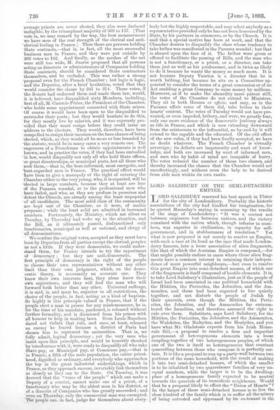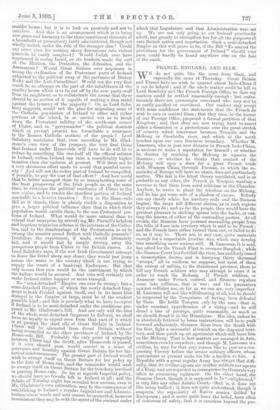LORD SALISBURY ON THE SEMI-DETACHED EMPIRE, ORD SALISBURY reserved his
best speech in -Ulster .4 for the city of Londonderry. Probably the historic associations of the city had kindled his imagination, for he quoted Macaulay's saying in summing up the results of the siege of Londonderry : "It was a contest not between engineers but between nations, and the victory remained with the nation which, though inferior in num- bers, was superior in civilisation, in capacity for self- government, and in stubbornness of resolution." Yet what is now proposed is not merely to resolve an Empire, with such a race at its head as the race that made London- derry famous, into a loose association of alien fragments, like that of which the Austrian Empire is composed,—for that might possibly endure in cases where these alien frag- ments have a common interest in retaining their indepen- dence of more powerful neighbours,—but even to resolve this great Empire into semi-detached masses, of which one of the fragments is itself composed of hostile elements. It is, to take Lord Salisbury's illustration, just as if the people of Israel had been associated in one political household with the Hittites, the Perizzites, the Jebusites, and the Am- monites, and these had been expected to live quietly together, and not disturb the people of Judah by their quarrels, even though the Hittites, the Periz- sites, the Jebusites, and the Ammonites far outnum- bered the Israelites, and therefore assumed the right to rule over them. Substitute, says Lord Salisbury, for the Hittites, the Perizzites, the Jebusites, and the Ammonites, the Walshites, the Nultyites, and the Healyites, and you have what Mr. Gladstone expects from his Irish Home- rule Bill,—a proposal to resolve a firm and impartial government of heterogeneous elements into a loose eoupling-together of two heterogeneous peoples, of which one of the two is itself so heterogeneous that constant quarrelling between those who compose it is perfectly cer- tain. It is like a proposal to run up a party-wall between two portions of the same household, with the result of making it into two semi-detached houses, of which the smaller is to be inhabited by two quarrelsome families of very un- equal numbers, while the larger is to be the dwelling- place of a homogeneous family expected to be neutral towards the quarrels of its immediate neighbours. Would that be a proposal likely to effect the "Union of Hearts" P In the larger of these semi-detached houses is to live the close kindred of the family which is to suffer all the misery of being outvoted and oppressed by its co-tenant in the smaller house ; but it is to look on passively and not to interfere. And this is an arrangement which is to bring new peace and harmony to the three constituent elements of a household at present very fairly administered, though not wholly united, under the rule of the stronger clan I Could. any surer plan for turning sharp discussions into violent quarrels be easily imagined ? Would Judah over have acquiesced in seeing Israel, on its borders, made the serf of the Hittites, the Perizzites, the Jebusites, and the Ammonites? Would. Great Britain ever acquiesce in seeing the civilisation of the Protestant parts of Ireland subjected to the political sway of the partisans of Bishop Nulty and the Anti-Parnellites? Would not the very first result be an attempt on the part of the inhabitants of the smaller house which is to be cut off by the new party-wall from its neighbour, so to redistribute the rooms that there should be no section of it capable of making a firm stand against the tyranny of the majority ? Or, as Lord. Salis- bury suggests, would not the plan for migrating some of the Catholic population of Ireland to other and richer portions of the island, be so carried out as to break down the Protestant solidity of the north-east corner of Ulster, and to " gerrymander " the political districts which at present present too formidable a resistance to the Roman Catholic sections of the people ? Lord. Salisbury maintains that, even according to Mr. Glad- stone's own view of the prospect, the very first thing that Ireland under Home-rule will have to do will be to reduce by something like one-half all the official salaries in Ireland, unless Ireland can raise a considerably higher taxation than she endures at present. Will there not be a very strenuous effort made to avoid that painful neces- sity? And will not the richer part of Ireland. be compelled, if possible, to pay the cost of that effort ? And. how could that be better managed than by so transplanting some of the least prosperous of the Irish people as, at the same time, to overcome the political resistance of Ulster to the new ragime, and to render the sturdiest portion of Ireland amenable to a heavier taxation ? Even in the Home-rule Bill as it stands, there is plainly visible a disposition to give a larger political influence than that to which their population would entitle them, to the non-Protestant por- tions of Ireland.. What would. be more natural than to extend that enterprise by revivifying Mr. Parnell's helpless and hopeless migration scheme in the interests of the Catho- lics, and to the disadvantage of the Protestants, so as to swamp the country round. Belfast with Catholic peasants ? Doubtless the experiment, if made, would ultimately fail, and it would fail by simply driving away the prosperous people from Ulster to the British shores. As Lord. Salisbury says, if the now Irish Government attempt to fleece the better sheep any closer, they would. just jump across the water to the country which is not trying to supply the wants of a bankrupt Exchequer. But that only means that ruin would. be the instrument by which the failure would be secured. And. ruin will certainly not make Ireland either happier or more tranquil. No." semi-detached" Empire can ever be strong ; but a semi-detached. Empire, of which the newly detached frag- ment is both divided against itself, and in its inner bias disloyal to the Empire at large, must be of the weakest possible kind ; and this is precisely what we have to expect if Ireland is to be semi-detached under the conditions pro- posed in Mr. Gladstone's Bill. And not only will the bias of the whole semi-detached fragment be disloyal, we shall have no loyalty to expect even from that part of it which is at present the chief ally of Great Britain in Ireland. Ulster will be alienated from Great Britain. without being reconciled to the other provinces of Ireland, by the Home-rule Bill. Probably the only point of sympathy between Ulster and the South, after Home-rule is passed, if it ever should pass, -would. consist in a sense of grievance and hostility against Great Britain for her his- torical misdemeanours. The greater part of Ireland would wish to avenge itself on Great Britain for her policy up to the date of Home-rule, .and the remainder would wish to avenge itself on Great Britain for the treachery involved in passing Home-rule. So far as regards Imperial policy, we should have no friends left in Ireland at all ; and the debate of Tuesday night has revealed how serious, even in Mr. Gladstone's own estimation, may be the consequence of establishing in Ireland a regular Legislature and Adminis- tration whose words and acts cannot be controlled, however inconsistent they may be with the spirit of the contract under which that Legislature and that Administration were set up. We are not only going to cut Ireland practically adrift, but greatly to strengthen her for all the purposes of anti-British action and negotiation. Such a semi-detached Empire as this will prove to be, if the Bill "To amend the provisions for the government of Ireland" should. ever pass, could hardly be found anywhere else on the faCe of the earth.







































 Previous page
Previous page